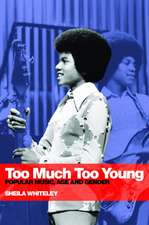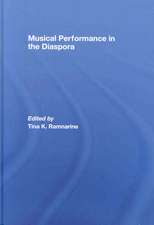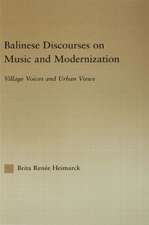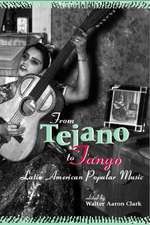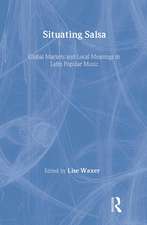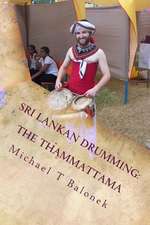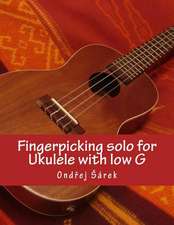Ethnomusicology: A Contemporary Reader, Volume II
Editat de Jennifer C. Posten Limba Engleză Hardback – 22 sep 2017
The collection of essays is organized into six sections:
- Property and Rights
- Applied Practice
- Knowledge and Agency
- Community and Social Space
- Embodiment and Cognition
- Curating Sound
| Toate formatele și edițiile | Preț | Express |
|---|---|---|
| Paperback (2) | 360.13 lei 6-8 săpt. | |
| Taylor & Francis – 25 sep 2017 | 360.13 lei 6-8 săpt. | |
| Taylor & Francis – 8 noi 2005 | 470.10 lei 6-8 săpt. | |
| Hardback (2) | 774.41 lei 6-8 săpt. | |
| Taylor & Francis – 22 sep 2017 | 774.41 lei 6-8 săpt. | |
| Taylor & Francis – 8 noi 2005 | 1018.43 lei 6-8 săpt. |
Preț: 774.41 lei
Preț vechi: 1033.39 lei
-25% Nou
Puncte Express: 1162
Preț estimativ în valută:
148.18€ • 155.13$ • 122.61£
148.18€ • 155.13$ • 122.61£
Carte tipărită la comandă
Livrare economică 05-19 aprilie
Preluare comenzi: 021 569.72.76
Specificații
ISBN-13: 9781138217874
ISBN-10: 1138217875
Pagini: 350
Dimensiuni: 178 x 254 mm
Greutate: 1.02 kg
Ediția:1
Editura: Taylor & Francis
Colecția Routledge
Locul publicării:Oxford, United Kingdom
ISBN-10: 1138217875
Pagini: 350
Dimensiuni: 178 x 254 mm
Greutate: 1.02 kg
Ediția:1
Editura: Taylor & Francis
Colecția Routledge
Locul publicării:Oxford, United Kingdom
Cuprins
PART I: Intellectual Property and Cultural Rights
1. Performing Protocol: Indigenous Traditional Knowledge as/and Intellectual Property (Beverley Diamond, with Aaron Corn, Frode Fjellheim, Cheryl L’Hirondelle, Moana Manipota, Allan Marett, Taqralik Partridge, John Carlos Perea, Ulla Pirttijärvi, and Per Niila Stålka)
2. "Justice with My Own Hands": The Serious Play of Piracy in Bolivian Indigenous Music Videos (Henry Stobart)
3. Modernist Reform, Virtuosity, and Uyghur Instrumental Music in Chinese Central Asia (Chuen-Fung Wong)
PART II: Applied Practice
4. From Neutrality to Praxis: The Shifting Politics of Ethnomusicology in the Contemporary World (Samuel Araújo)
5. The Ethnomusicologist at the Rock Face: Reflections on Working at the Nexus of Music and Mining (Kirsty Gillespie)
6. Social Shifts and Viable Musical Futures: The Case of Cambodian Smot (Catherine Grant)
7. Medical Ethnomusicology and Psychological Flexibility in Wellness, Health, and Wellness (Benjamin D. Koen)
PART III: Knowledge and Agency
8. Bird Song and Song about a Bird: Popular Music and the Mediation of Traditional Ecological Knowledge in Northeastern Brazil (Michael B. Silvers)
9. Music, Environment and Place in Kam Big Song (Catherine Ingram)
10. Ecological Knowledge, Collaborative Management, and Musical Production in Western Mongolia (Jennifer C. Post)
11. Music and Non-Human Agency (Bernd Brabec de Mori)
PART IV: Community and Social Space
12. Rethinking the Urban Community: (Re) Mapping Musical Processes and Places (Kay Kaufman Shelemay)
13. Mixed Modes and Performance Codes of Political Demonstrations and Carnival in Haiti (Rebecca Dirksen)
14. Soundscapes of Pilgrimage: European and American Christians in Jerusalem’s Old City (Abigail Wood)
PART V: Embodiment and Cognition
15. Time, Gesture, and Attention in a Khyāl Performance (Martin Clayton)
16. Speaking with the Body in Nigerian and Cuban Orisha Music: Musical Movements in Song, Dance, and Trance (Amanda Villepastour)
17. Gaming the System: Gender and Performance in Dance Central (Kiri Miller)
PART VI: Curating Sound
18. Preserving the Past, Activating the Future: Collaborative Archiving in Ethnomusicology (John Vallier)
19. "Curating Sound Is Impossible": Views from the Streets, Galleries, and Rainforests (Noel Lobley)
1. Performing Protocol: Indigenous Traditional Knowledge as/and Intellectual Property (Beverley Diamond, with Aaron Corn, Frode Fjellheim, Cheryl L’Hirondelle, Moana Manipota, Allan Marett, Taqralik Partridge, John Carlos Perea, Ulla Pirttijärvi, and Per Niila Stålka)
2. "Justice with My Own Hands": The Serious Play of Piracy in Bolivian Indigenous Music Videos (Henry Stobart)
3. Modernist Reform, Virtuosity, and Uyghur Instrumental Music in Chinese Central Asia (Chuen-Fung Wong)
PART II: Applied Practice
4. From Neutrality to Praxis: The Shifting Politics of Ethnomusicology in the Contemporary World (Samuel Araújo)
5. The Ethnomusicologist at the Rock Face: Reflections on Working at the Nexus of Music and Mining (Kirsty Gillespie)
6. Social Shifts and Viable Musical Futures: The Case of Cambodian Smot (Catherine Grant)
7. Medical Ethnomusicology and Psychological Flexibility in Wellness, Health, and Wellness (Benjamin D. Koen)
PART III: Knowledge and Agency
8. Bird Song and Song about a Bird: Popular Music and the Mediation of Traditional Ecological Knowledge in Northeastern Brazil (Michael B. Silvers)
9. Music, Environment and Place in Kam Big Song (Catherine Ingram)
10. Ecological Knowledge, Collaborative Management, and Musical Production in Western Mongolia (Jennifer C. Post)
11. Music and Non-Human Agency (Bernd Brabec de Mori)
PART IV: Community and Social Space
12. Rethinking the Urban Community: (Re) Mapping Musical Processes and Places (Kay Kaufman Shelemay)
13. Mixed Modes and Performance Codes of Political Demonstrations and Carnival in Haiti (Rebecca Dirksen)
14. Soundscapes of Pilgrimage: European and American Christians in Jerusalem’s Old City (Abigail Wood)
PART V: Embodiment and Cognition
15. Time, Gesture, and Attention in a Khyāl Performance (Martin Clayton)
16. Speaking with the Body in Nigerian and Cuban Orisha Music: Musical Movements in Song, Dance, and Trance (Amanda Villepastour)
17. Gaming the System: Gender and Performance in Dance Central (Kiri Miller)
PART VI: Curating Sound
18. Preserving the Past, Activating the Future: Collaborative Archiving in Ethnomusicology (John Vallier)
19. "Curating Sound Is Impossible": Views from the Streets, Galleries, and Rainforests (Noel Lobley)
Notă biografică
Jennifer C. Post is Lecturer at University of Arizona School of Music and Honorary Senior Research Fellow at University of Western Australia.
Descriere
Ethnomusicology: A Contemporary Reader, Volume II provides an overview of developments in the study of ethnomusicology in the 21st century, offering an introduction to contemporary issues relevant to the field. Nineteen essays, written by an international array of scholars, highlight the relationship between current issues in the discipline and ethnomusicologists’ engagement with diverse forms of advocacy, issues such as poverty and social participation, maintaining intangible cultural heritages, and ecological concerns. It provides a forum for rethinking the discipline’s identity in terms of major themes and issues to which ethnomusicologists have turned their attention since the first volume published in 2006.
The collection of essays is organized into six sections:
The collection of essays is organized into six sections:
- Intellectual Property and Cultural Rights
- Applied Practices
- Knowledge and Agency
- Community and Social Space
- Embodiment and Cognition
- Curating Sound


